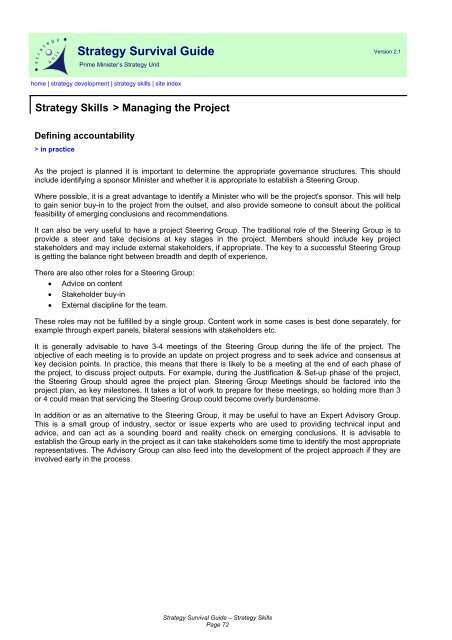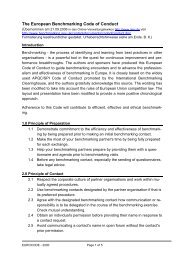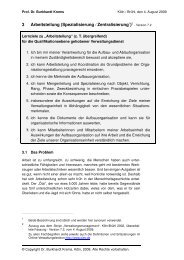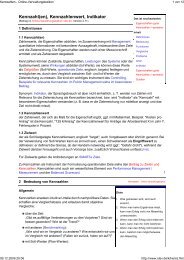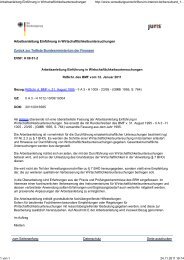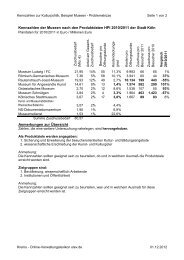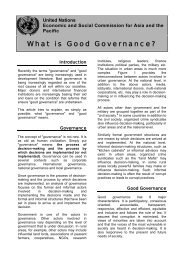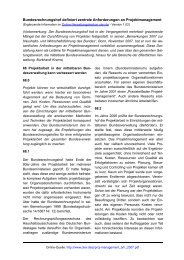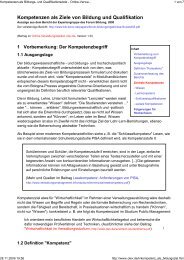Strategy Survival Guide
Strategy Survival Guide
Strategy Survival Guide
Create successful ePaper yourself
Turn your PDF publications into a flip-book with our unique Google optimized e-Paper software.
<strong>Strategy</strong> <strong>Survival</strong> <strong>Guide</strong> Version 2.1<br />
Prime Minister’s <strong>Strategy</strong> Unit<br />
home | strategy development | strategy skills | site index<br />
<strong>Strategy</strong> Skills > Managing the Project<br />
Defining accountability<br />
> in practice<br />
As the project is planned it is important to determine the appropriate governance structures. This should<br />
include identifying a sponsor Minister and whether it is appropriate to establish a Steering Group.<br />
Where possible, it is a great advantage to identify a Minister who will be the project's sponsor. This will help<br />
to gain senior buy-in to the project from the outset, and also provide someone to consult about the political<br />
feasibility of emerging conclusions and recommendations.<br />
It can also be very useful to have a project Steering Group. The traditional role of the Steering Group is to<br />
provide a steer and take decisions at key stages in the project. Members should include key project<br />
stakeholders and may include external stakeholders, if appropriate. The key to a successful Steering Group<br />
is getting the balance right between breadth and depth of experience.<br />
There are also other roles for a Steering Group:<br />
• Advice on content<br />
• Stakeholder buy-in<br />
• External discipline for the team.<br />
These roles may not be fulfilled by a single group. Content work in some cases is best done separately, for<br />
example through expert panels, bilateral sessions with stakeholders etc.<br />
It is generally advisable to have 3-4 meetings of the Steering Group during the life of the project. The<br />
objective of each meeting is to provide an update on project progress and to seek advice and consensus at<br />
key decision points. In practice, this means that there is likely to be a meeting at the end of each phase of<br />
the project, to discuss project outputs. For example, during the Justification & Set-up phase of the project,<br />
the Steering Group should agree the project plan. Steering Group Meetings should be factored into the<br />
project plan, as key milestones. It takes a lot of work to prepare for these meetings, so holding more than 3<br />
or 4 could mean that servicing the Steering Group could become overly burdensome.<br />
In addition or as an alternative to the Steering Group, it may be useful to have an Expert Advisory Group.<br />
This is a small group of industry, sector or issue experts who are used to providing technical input and<br />
advice, and can act as a sounding board and reality check on emerging conclusions. It is advisable to<br />
establish the Group early in the project as it can take stakeholders some time to identify the most appropriate<br />
representatives. The Advisory Group can also feed into the development of the project approach if they are<br />
involved early in the process.<br />
<strong>Strategy</strong> <strong>Survival</strong> <strong>Guide</strong> – <strong>Strategy</strong> Skills<br />
Page 72


